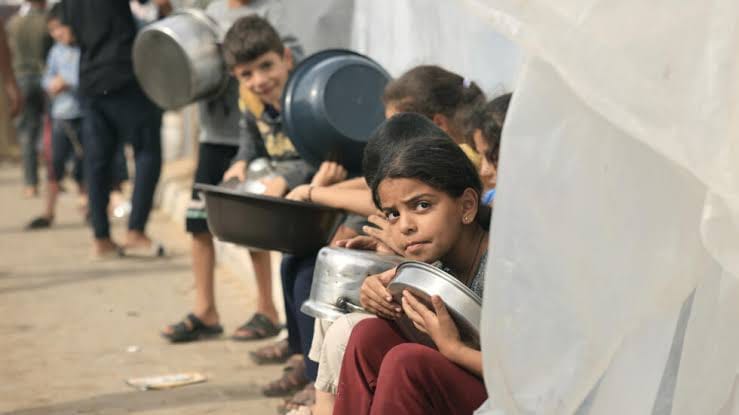Displaced Gazans live in dust, fear and hunger

At first Youssef Mehna thought the war would quickly be over. Then he was wounded, his house was destroyed, and he was forced to survive “25 days without anything”.
So like thousands of others, Mehna finally fled north Gaza for the south.
Perched on trucks, crammed into cars, pulled by donkeys on carts, and on foot, tens of thousands of Palestinians are fleeing Israeli army strikes on the territory squeezed between Israel, Egypt and the Mediterranean.
At the Bani Suheila crossroads in Khan Yunis, on the immense Salah Al-Din road that threads Gaza top to bottom, the processions are growing still.
People fleeing Gaza City are joined by those leaving Khan Yunis heading further south, towards Rafah, the last city before Egypt.
Mehna left the Jabalia refugee camp at seven in the morning, in the north of Gaza City, also hoping to reach Rafah.
But his journey finished in Khan Yunis, after eight hours of travel covering only 25 kilometers (15 miles).
“I already paid 500 shekels ($130) to come from Jabalia and so I have nothing more to carry on to Rafah,” he said with a drawn face, surrounded by his six children.
- ‘Not even a morsel of bread’ –
Because his sick wife is in a wheelchair, he had to rent “carts pulled by donkeys, trucks, cars” to transport her.
Each trip was short, as fuel shortages prevent drivers from accepting long-distance fares.
Sometimes, between car rides, they were forced to go on foot. “So it was me who pushed my wife’s chair,” he told AFP.
Around him, hundreds of families were waiting.
Children sleep on the floor beside parents wondering how they will live in a territory where more than 1.5 million people are displaced and nearly one house in two has been destroyed, according to the United Nations.
In southern Gaza, overflowing with displaced from the north, rents of $150 a month are now up to $500 to $1000.
“I don’t even have a morsel of bread to feed my kids,” said Umm Yaaqub. “Since six in the morning I have been looking everywhere.”
“I can’t give them anything to eat,” added the 42-year-old, who arrived in Khan Yunis three days ago with her husband and seven children from Gaza City.
The UN has said access to bread in the south is “challenging” because “the only operative mill in Gaza remains unable to grind wheat due to a lack of electricity and fuel”.
On October 7 Hamas, in power in Gaza, launched an attack on southern Israel, killing some 1,200 people, mostly civilians and taking 239 hostages, according to Israel.
Since then Israel has been bombing the Gaza Strip and has killed more than 11,000 people, also mostly civilians, according to the Hamas health ministry.
Before the war, a little over 80 per cent of Gazans lived in poverty and almost two-thirds were dependent on international aid, especially for food, according to the UN.
Now, 50-kilo sacks of flour have increased in price from 40 shekels to 150 shekels, so it’s worse still.
- ‘Not a single shekel’ –
But hunger is not the only worry for Umm Yaaqub. “My husband has heart problems,” she says.
And her 20-year-old daughter Rim “is normally in a medical bed”. “But we all sleep on the ground, in the dust, and we don’t have a single blanket even though the nights are very cold.”
Her husband Atef Abu Jarad, 47, remains in a classroom on the first floor of a school where the family camps now, next to dozens of other displaced.
“I’m the head of the family, but I don’t have a single shekel to buy something for my kids to eat,” he laments.
Shops across southern Gaza are running out of everything. Bottled water, milk for children, nappies, pasta and juices are now nearly impossible to find.
A little food aid is trickling through to the displaced according to Abu Jarad: “a portion of rice to share between seven” members of his family.
“So I take a small spoon of rice and I tell them I’m full so they can eat,” he says.
Water flows from a tap where long crowds of displaced people queue. “People push and I don’t have the strength to resist,” he says.
His daughter Rim had to give up the painkillers she has taken since birth, because she suffers spinal and shoulder malformations.
“The pain prevents me from sleeping but we can’t buy medicines,” she says.
She too forgoes meals because her brothers and sisters “have more need to eat”.
by Mai Yaghi
©️ Agence France-Presse












